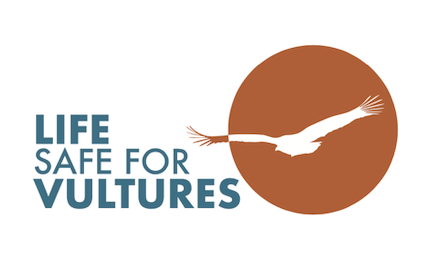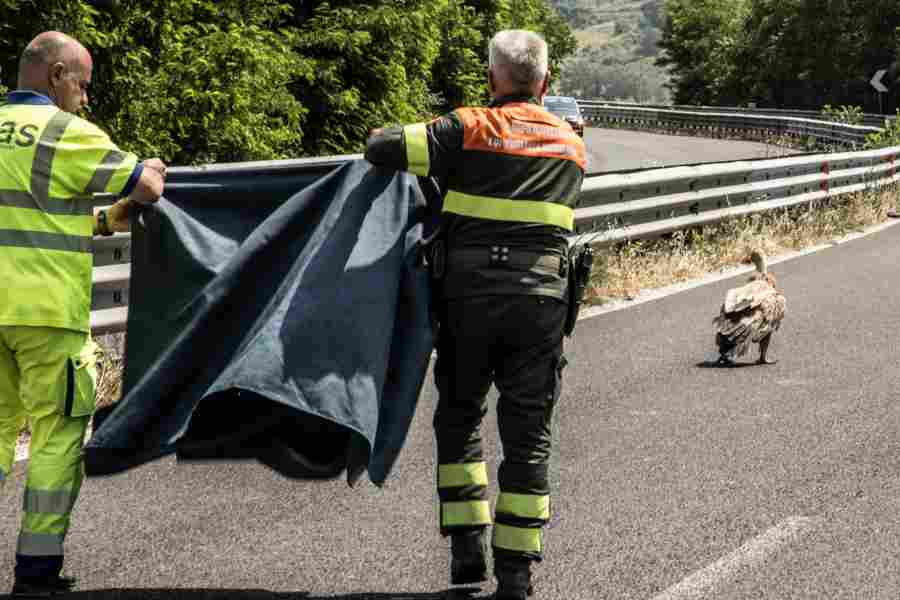In a significant move to ensure the safety and long-term well-being of Griffon Vultures in Sardinia, the Life Safe for Vultures project organised an international conference and a workshop about wildlife crime. The events focused on the European legal framework of wildlife crime, how to approach and manage wildlife crime cases and forensic investigations. Experts from the main partners of the project shared their expertise and case studies – they even took the first steps toward a forming new regional law against wildlife crime.

Addressing wildlife crime
May has been rich of significant events for the LIFE Safe for Vultures project in Sardinia. From the release of Griffon Vultures in the southern area of the island to the transfer in the acclimatisation aviary of a new group of birds coming from France and Spain. However, reintroducing Griffon Vultures is only a small part of this ambitious initiative. To make sure these birds can re-build a healthy colony, it is necessary to address the causes of their past decline. In this spirit, LIFE Safe for Vultures project organised an international conference and a workshop about wildlife crime joining forces with experts from all over Europe, including some of the project key partners.
Combating wildlife crime is a crucial part of every conservation action, and it becomes especially important for vultures since they are often unintentional victims of those crimes. Poisoning, the crime that most affects vultures, often goes unnoticed until it is too late, and it has devastating impact on their numbers. Since Griffon Vultures often feed in groups, one single poisoned carcass can kill many birds and its effects are even more devastating during reproductive season when adults feed chicks after their meal.
Key themes and objectives
By bringing together experts and stakeholders from different countries and with multiple expertise, the events created a platform for detailed discussions on the current state of wildlife crime legal framework in Europe, the most advanced investigative techniques, and the necessity of raising awareness about a phenomenon that is as widespread as it is harmful to ecosystems and biodiversity. The goal was to engage with experts in this field, involve public opinion and promote the commitment of national and regional authorities to strengthen tools against wildlife crimes in Sardinia.
The events saw the participation of the project leader, the Department of Veterinary Medicine of the University of Sassari, and its main partners: Forestas Agency, the Forestry and Environmental Surveillance Corps, Experimental Zooprophylactic Institute of Sardinia, Junta de Andalucía, and Vulture Conservation Foundation (VCF).
Training days on the investigation of crimes against wildlife – 7-8 May
In these first two days, the participants focused on working on crime scenes and learning the legal framework around them. The first part of the event was dedicated to how to safely approach a poisoning case, identify non-natural deaths in wild animals, collect evidence, and what protocols to follow. Regional and international case studies were illustrated and discussed among the participants.

The VCF’s Vulture Programmes Manager, Jovan Andevski illustrated the international training programme for wildlife crime investigations, better known as Wildlife Crime Academy. The academy was conceived within the BalkanDetox LIFE project led by Vulture Conservation Foundation in close collaboration with the Regional Government of Andalusia (Junta de Andalucía), and the Spanish ministry for the ecological transition, and co-funded by the LIFE Programme and the MAVA Foundation. It aims to enhance law enforcement efficiency in tackling wildlife crime by creating a network for the exchange of knowledge and best practices experiences. The Academy’s courses are designed to address various aspects of wildlife crime, including illegal killing, trapping, and poisoning. To date, the Academy has conducted five training courses with representatives from Albania, Bosnia and Herzegovina, Bulgaria, Croatia, Cyprus, Greece, Egypt, Lebanon, Italy, Morocco, North Macedonia, Serbia and Spain.
The second half of the events was dedicated to the case studies of Sardinian wildlife rehabilitation centres, the anti-poisoning dog units and the Andalusian law framework. Lastly, the workshop included some practical activities, like the re-enactment of crime scenes and forensic necroscopy, during which all participants could test their knowledge and abilities.




Wildlife protection and normative framework: Towards a regional law in Sardinia – 13 May
Professor Orlando Paciello, professor at the Federico II University of Naples, opened the conference with a presentation on “Legal Protection of Wildlife and Operational Tools to Combat Animal Crimes”. His talk set the stage for understanding the Italian legal framework of combating wildlife crimes.
Highlighting the importance of international collaboration, our Vulture Programmes Manager Jovan Andevski shared insights from Spain’s judicial procedures in combating wildlife crimes. Moving from Spain back to Sardinia, Giovanni Tesei and Umberto Graziano of the Forestry and Environmental Surveillance Corps of Sardinia Region presented significant poisoning cases occurred in the island. To create a centralised database, monitor and analyse similar incidents, The Experimental Zooprophylactic Institute of Sardinia created a dedicated portal, presented by the institute representative Davide Pintus. Maria Paola Asara, deputy prosecutor of the Sassari Public Prosecutor’s Office, provided a detailed look into Sardinian legal proceedings for poisoning crimes with a specific case study. Lastly, Tesei and Graziano concluded the presentations by discussing possible recommendations for a new regional law that could offer stronger protection for wildlife.
The event encouraged a collaborative approach among the participants, dedicating time to exchange ideas and develop effective future strategies against wildlife crime, especially poisoning.
Together for biodiversity conservation
Wildlife crime is a complex and multifactorial issue that requires a collaborative approach for an effective resolution. By gathering experts from different European countries and diverse backgrounds, the LIFE Safe for Vultures project created the perfect chance for professionals to exchange information and learn from each other. The events resulted in a fortified network of experts ready to intervene against wildlife crime and promote biodiversity conservation with an international approach.
The first step towards a regional law against wildlife crime in Sardinia has been taken, thanks to the Department of Veterinary Medicine of the University of Sassari, and all the LIFE Safe for Vultures partners. Raising awareness is the foundation of combating wildlife crimes. Therefore, events like these are vital to continuing addressing together this widespread and destructive phenomenon.
The LIFE Safe for Vultures project

LIFE Safe for Vultures is co-financed by the EU’s LIFE Programme to restore the vulture guild in Sardinia. The University of Sassari leads the project in collaboration with Agenzia Regionale Forestas, Sardegna Corpo Forestale, E-Distribuzione and the Vulture Conservation Foundation. LIFE Safe for Vultures builds on the work of the successful LIFE Under Griffon Wings, with the ultimate objective for Griffon Vultures to regain their historic ranges and distribution areas from the central-eastern part of Sardinia to the south and promote the long-term survival of the species on the island. An additional feeding station will be established south of the island, and 40 additional Griffon Vultures will be translocated and released.




